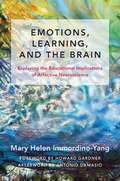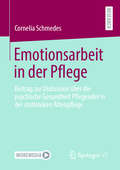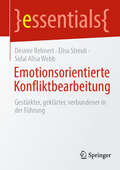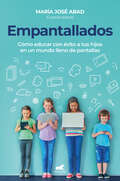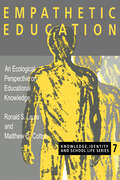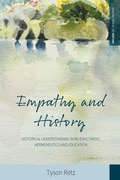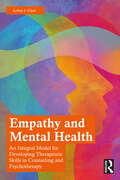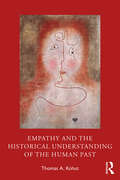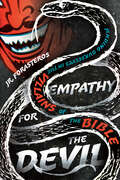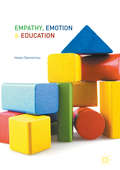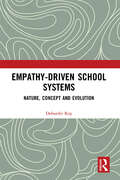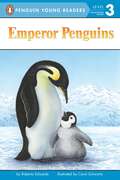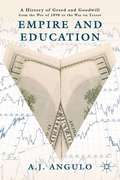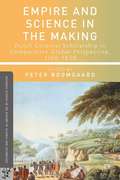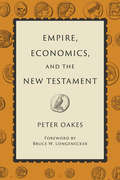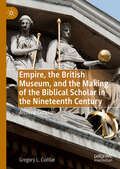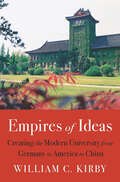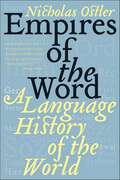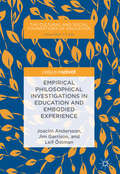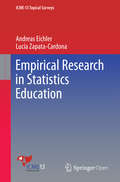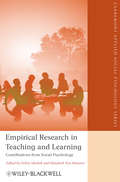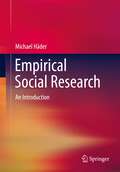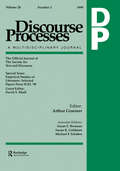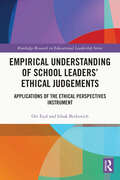- Table View
- List View
Emotions, Learning, and the Brain: Exploring the Educational Implications of Affective Neuroscience (The Norton Series on the Social Neuroscience of Education)
by Antonio Damasio Howard Gardner Mary Helen Immordino-YangAn orientation to affective neuroscience as it relates to educators. In this ground-breaking collection, Mary Helen Immordino-Yang--an affective neuroscientist, human development psychologist, and former public school teacher--presents a decade of work with the potential to revolutionize educational theory and practice by deeply enriching our understanding of the complex connection between emotion and learning. With her signature talent for explaining and interpreting neuroscientific findings in practical, teacher-relevant terms, Immordino-Yang offers two simple but profound ideas: first, that emotions are such powerful motivators of learning because they activate brain mechanisms that originally evolved to manage our basic survival; and second, that meaningful thinking and learning are inherently emotional, because we only think deeply about things we care about. Together, these insights suggest that in order to motivate students for academic learning, produce deep understanding, and ensure the transfer of educational experiences into real-world skills and careers, educators must find ways to leverage the emotional aspects of learning. Immordino-Yang has both the gift for captivating readers with her research and the ability to connect this research to everyday learning and teaching. She examines true stories of learning success with relentless curiosity and an illuminating mixture of the scientific and the human. What are feelings, and how does the brain support them? What role do feelings play in the brain's learning process? This book unpacks these crucial questions and many more, including the neurobiological, developmental, and evolutionary origins of creativity, facts and myths about mirror neurons, and how the perspective of social and affective neuroscience can inform the design of learning technologies.
Emotionsarbeit in der Pflege: Beitrag zur Diskussion über die psychische Gesundheit Pflegender in der stationären Altenpflege
by Cornelia SchmedesDer Kern der pflegerischen Arbeit ist die Gestaltung von Beziehungen. Dieser Blickwinkel wird in einer ökonomisch orientierten Pflegewelt derzeit vernachlässigt. Pflegende versuchen täglich den Spagat zwischen den Anforderungen der Arbeitgeber und den Bedürfnissen der Bewohner und Angehörigen. Kompensatorisch nutzen Pflegende Emotionsmanagement um diesen Anforderungen gerecht zu werden. Besonders oberflächliches Zeigen von Emotionen kann folgenschwere Auswirkungen auf die psychische Gesundheit haben und genau dieses wird zur Alltagspraxis der Pflegenden. Strategien zur systematischen Beziehungsgestaltung mit den gezielten Methoden der Emotionsregulation werden in der gegenwärtigen Pflegepraxis stark vernachlässigt. Dozentin an der Katholischen Akademie Stapelfeld für die Bereiche Familie, Lebensphase, Soziale Berufe und Pflege.
Emotionsorientierte Konfliktbearbeitung: Gestärkter, geklärter, verbundener in der Führung (essentials)
by Désirée Rehnert Elisa Streuli Sidal Alisa WebbKonflikte sind ständige Begleiter in unserer Arbeitswelt. Sie weisen auf Schwachstellen der Organisation hin und zeigen Weiterentwicklungsmöglichkeiten auf. Gleichzeitig sind sie für die Beteiligten oft enorm belastend. Dieses Buch präsentiert anhand konkreter Praxisbeispiele Modelle und Werkzeuge zur effektiven Konfliktbewältigung aus der Führungsrolle. Profitieren Sie von fundierten Strategien der Emotionsregulation und der wirksamen Kommunikation. Auf diese Weise gelingt es Ihnen, Konflikte lösungsorientiert zu bearbeiten und sie als Chance für eine geklärte und gestärkte Zusammenarbeit zu nutzen.
Empantallados: Cómo educar con éxito a tus hijos en un mundo lleno de pantallas
by Mª José Abad Villagra Mª del García de Leániz Luisfer Martínez Alhama José Martín AguadoLa guía más completa para cuidar de nuestra salud digital y educar a nuestros hijos en un uso responsable de la tecnología. Las pantallas no solo afectan a la seguridad, sino también a la personalidad, sociabilidad y creatividad de nuestros hijos. Es hora de ponerse manos a la obra: la tecnología ha llegado para quedarse, así que aprovechémosla como una oportunidad para educar. Empantallados es un libro práctico, al mismo tiempo que atemporal. Es un manual que no se limita a las modas o tendencias actuales, sino que sirve para cualquier padre o madre que quiera educar mejor a sus hijos en el entorno digital, con ejemplos de casos reales y un lenguaje comprensible para todos. Una guía, en defi nitiva, imprescindible para una buena salud digital. Las primeras lectoras han dicho:«Un libro que recomendaría a todos los padres y madres para tener en casa. Creo que se convertirá para ellos en un manual de consulta continua.»Paloma Blanc (@7paresdeKatiuskas), madre de familia numerosa «Una gran ayuda para encontrar pautas sobre por dónde empezar y qué es importante tener en cuenta para promover un uso saludable de la tecnología en niños y adolescentes.»Charo Sádaba, decana de la Facultad de Comunicación de la Universidad de Navarra y ranking TOP 100 mujeres líderes en la categoría de pensadoras y expertas
Empathetic Education: An Ecological Perspective on Educational Knowledge
by Ronald S. Laura Mathew C. CottonThe health of our global environment is increasingly affected by our technological advance - rain, rivers, lakes, forests, soil, climate all suffer at human hands. Laura and Cotton suggest that the society committed to the technological transformation of the natural environment into an artificial one, is also, paradoxically, a society committed to its own destruction. Currently, one of the major concerns of environmental education is to address this problem more concertedly than hitherto. This book represents a radical departure from the traditional approach to environmental education. It argues that the knowledge base behind current teaching is flawed, and the resulting mind-sets and attitudes are often counterproductive to the aims of environmental education.
Empathy and History: Historical Understanding in Re-enactment, Hermeneutics and Education (Making Sense of History #35)
by Tyson RetzSince empathy first emerged as an object of inquiry within British history education in the early 1970s, teachers, scholars and policymakers have debated the concept’s role in the teaching and learning of history. Yet over the years this discussion has been confined to specialized education outlets, while empathy’s broader significance for history and philosophy has too often gone unnoticed. Empathy and History is the first comprehensive account of empathy’s place in the practice, teaching, and philosophy of history. Beginning with the concept’s roots in nineteenth-century German historicism, the book follows its historical development, transformation, and deployment while revealing its relevance for practitioners today.
Empathy and Mental Health: An Integral Model for Developing Therapeutic Skills in Counseling and Psychotherapy
by Arthur J. ClarkEmpathy and Mental Health shows mental health professionals how to employ a deeper understanding of subjective, objective, and interpersonal modalities of empathy in their practice. Chapters are full of case studies and examples that demonstrate empathy’s role in challenging and complex encounters, and as each concept and process is introduced, Dr. Clark discusses strategies for responding empathically. The book has a sound theoretical grounding that is informed by extensive material on empathy and empathic understanding from the counseling and psychotherapy literature and related fields of inquiry. Drawing from psychodynamic, existential-humanistic, cognitive behavioral, and other contemporary orientations, this text makes empathy immediately useful and understandable to students and practitioners.
Empathy and the Historical Understanding of the Human Past
by Thomas A. KohutEmpathy and the Historical Understanding of the Human Past is a comprehensive consideration of the role of empathy in historical knowledge, informed by the literature on empathy in fields including history, psychoanalysis, psychology, neuroscience, philosophy, and sociology. The book seeks to raise the consciousness of historians about empathy, by introducing them to the history of the concept and to its status in fields outside of history. It also seeks to raise the self-consciousness of historians about their use of empathy to know and understand past people. Defining empathy as thinking and feeling, as imagining, one’s way inside the experience of others in order to know and understand them, Thomas A. Kohut distinguishes between the external and the empathic observational position, the position of the historical subject. He argues that historians need to be aware of their observational position, of when they are empathizing and when they are not. Indeed, Kohut advocates for the deliberate, self-reflective use of empathy as a legitimate and important mode of historical inquiry. Insightful, cogent, and interdisciplinary, the book will be essential for historians, students of history, and psychoanalysts, as well as those in other fields who seek to seek to know and understand human beings.
Empathy for the Devil: Finding Ourselves in the Villains of the Bible
by Jr. ForasterosDo we have anything in common with the bad guys of the Bible? The sins of wrath, idolatry, and abuse of power are closer to us than we think. How do we guard against them? We learn not only by following moral exemplars—we also need to look at the warnings of lives gone wrong. In this fictionalized narrative, JR. Forasteros reintroduces us to some of the most villainous characters of Scripture. He shows us what we can learn from their negative examples, with figures such as Cain, Jezebel, King Herod, Sampson and Delilah, and even Satan serving as cautionary tales of sin and temptation. Forasteros vividly tells their stories to help us understand their motivations, and his astute biblical and cultural exposition points out what we often miss about their lives. We soon discover that we might have more in common with these characters than we would like to admit. Take a fresh look at the scoundrels of Scripture, and find sound pastoral guidance here to walk the path of righteousness.
Empathy, Emotion and Education
by Helen DemetriouThis book explores the construct of empathy and its connection with education. Charting literature on the origins and evolution of the concept of empathy, the author examines the multifaceted nature of empathy and the external and internal influences behind this concept. The relationship between empathy and education is examined through the impact they have on each other for the development of social and emotional understanding, positive social behaviours and effective teaching and learning. In doing so, the author emphasises that empathy apparent in the early years of life is invaluable for enhancing the quality of teaching and learning in future, and should be elicited from pupils and teachers alike. This book will be of interest to practitioners, educational psychologists, and researchers in empathy and its effect on education.
Empathy-Driven School Systems: Nature, Concept and Evolution
by Debarshi RoyThis book provides a framework for designing behavioural systems in schools that recognize empathy as its core driver. It presents a systemic discourse on introducing steps in schools to promote inclusivity and acceptance. The book analyses how empathy can be integrated into every aspect of school education. It focuses on the role of schools in nurturing compassion in young children and providing a positive psychological atmosphere for them. The author outlines the concept of empathy and its application to organizations in general and its specific application within school systems. Drawing from theoretical and empirical literature, the book examines the designs for holistic empathy-driven learning, highlighting its role in fostering social integration and developing social and emotional skills in students of diverse backgrounds. This book will be of interest to students, teachers and researchers of education, organizational psychology, organizational behaviour and child psychology. It will also be useful for educationalists, schoolteachers, school management professionals, heads of schools and parents.
Emperor Penguins (Penguin Young Readers, Level 3)
by Roberta EdwardsBeginning readers can chill out with one of the coolest creatures around—the emperor penguin. Did you know that penguins can't fly? Or that emperor penguins can stay underwater for almost twenty minutes? Learn more about penguin work and playtime in this cool All Aboard Science Reader!
Empire and Education
by A. J. AnguloThis book is about education and American imperialism from the War of 1898 to the War on Terror. Very little coordinated or sustained research has been devoted to the broader contours of America, education, and empire. And third, this volume seeks to inspire new directions in the study of American educational history.
Empire and Science in the Making
by Peter BoomgaardDrawing on extensive new research, and bringing much new scholarship before English readers for the first time, this wide-ranging volume examines how knowledge was created and circulated throughout the Dutch Empire, and how these processes compared with those of the Imperial Britain, Spain, and Russia.
Empire, Economics, and the New Testament
by Peter OakesPeter Oakes has long been recognized for his illuminating use of Greco-Roman material culture and social-scientific criticism to interpret the New Testament. This volume combines his best work in a single volume and introduces a substantial new essay that challenges current scholarly approaches to paradoxical teachings of the New Testament. Of special interest to Oakes throughout this book is the concrete impact of economic realities and Roman imperialism on first-century Christian communities meeting in house churches. To address this, Oakes considers an array of textual and archaeological resources from first-century non-elite life, including extensive archaeological evidence available from Pompeii. Readers will find here a deep trove of wisdom for understanding the New Testament in the context of the Greco-Roman world.
Empire, the British Museum, and the Making of the Biblical Scholar in the Nineteenth Century: Archival Criticism
by Gregory L. CuéllarSince the modern period, the field of biblical studies has relied upon libraries, museums, and archives for its evidentiary and credentialing needs. Yet, absent in biblical scholarship is a thorough and critical examination of the instrumentality of the discipline’s master archives for elite power structures. Addressing this gap in biblical scholarship lies central to this book. Interrogated here is a premier repository or master archive of the discipline: the British Museum. Using an assemblage of critical theories from archival discourse to postcolonial studies, space theory to governmentality studies, the focal point of this book is at the intersections of the Museum’s rise to scientific prominence, the British Empire, and the conferring of scientific authority to modern biblical critics in the nineteenth century. Gregory L. Cuéllar initiates a season of historicization of the master archives of biblical studies and archival criticism.
Empires of Ideas: Creating the Modern University from Germany to America to China
by William C. KirbyThe modern university was born in Germany. In the twentieth century, the United States leapfrogged Germany to become the global leader in higher education. Will China challenge its position in the twenty-first?Today American institutions dominate nearly every major ranking of global universities. Yet in historical terms, America’s preeminence is relatively new, and there is no reason to assume that US schools will continue to lead the world a century from now. Indeed, America’s supremacy in higher education is under great stress, particularly at its public universities. At the same time Chinese universities are on the ascent. Thirty years ago, Chinese institutions were reopening after the catastrophe of the Cultural Revolution; today they are some of the most innovative educational centers in the world. Will China threaten American primacy?Empires of Ideas looks to the past two hundred years for answers, chronicling two revolutions in higher education: the birth of the research university and its integration with the liberal education model. William C. Kirby examines the successes of leading universities—The University of Berlin and the Free University of Berlin in Germany; Harvard, Duke, and the University of California, Berkeley, in the United States—to determine how they rose to prominence and what threats they currently face. Kirby draws illuminating comparisons to the trajectories of three Chinese contenders: Tsinghua University, Nanjing University, and the University of Hong Kong, which aim to be world-class institutions that can compete with the best the United States and Europe have to offer.But Chinese institutions also face obstacles. Kirby analyzes the challenges that Chinese academic leaders must confront: reinvesting in undergraduate teaching, developing new models of funding, and navigating a political system that may undermine a true commitment to free inquiry and academic excellence.
Empires of Ideas: Creating the Modern University from Germany to America to China
by William C. KirbyA Marginal Revolution Best Non-fiction Book “[A] fascinating book.” –Steven Mintz, Inside Higher Ed“Substantive on virtually every page, the author actually understands how universities work…An impressive performance.” —Tyler Cowen, Marginal Revolution “With his extraordinary breadth of curiosity and equal ease in the histories and cultures of these countries, only Bill Kirby could have written this book. It is must-reading for everyone who cares about universities, a thought-provoking lesson in the strange mix of durability and vulnerability that defines this key modern institution.” —Richard Broadhead, President Emeritus, Duke University“William Kirby’s new book is unique. I know of nothing else on higher education that resembles it in breadth, scope, and sheer comparative information and analysis. Anyone interested in the nature of universities during the past two centuries will want to read this volume.” —Neil L. Rudenstine, President Emeritus, Harvard UniversityToday American institutions dominate nearly every major ranking of global universities. Yet in historical terms, America’s preeminence is relatively new, and there is no reason to assume that US schools will continue to lead the world a century from now. Indeed, America’s supremacy in higher education is under great stress, particularly at its public universities, while Chinese universities are on the ascent. Will China threaten American primacy? Empires of Ideas looks to the past two hundred years for answers, examining the successes of leading universities to determine how they rose to prominence and what threats they currently face. William C. Kirby gives special attention to the challenges that Chinese academic leaders must confront: reinvesting in undergraduate teaching, developing new models of funding, and navigating a political system that may undermine a true commitment to free inquiry and academic excellence.
Empires of the Word: A Language History of the World
by Nicholas OstlerNicholas Ostler's Empires of the Word is the first history of the world's great tongues, gloriously celebrating the wonder of words that binds communities together and makes possible both the living of a common history and the telling of it. From the uncanny resilience of Chinese through twenty centuries of invasions to the engaging self-regard of Greek and to the struggles that gave birth to the languages of modern Europe, these epic achievements and more are brilliantly explored, as are the fascinating failures of once "universal" languages. A splendid, authoritative, and remarkable work, it demonstrates how the language history of the world eloquently reveals the real character of our planet's diverse peoples and prepares us for a linguistic future full of surprises.
Empirical Philosophical Investigations in Education and Embodied Experience (The\cultural And Social Foundations Of Education Ser.)
by Jim Garrison Joacim Andersson Leif ÖstmanDrawing on John Dewey and the later Ludwig Wittgenstein, this book employs philosophy as a conceptual resource to develop new methodological and analytical tools for conducting in situ empirical investigations. Chapter one explores the philosophies of Wittgenstein and Dewey. Chapter two exposits Deweyan ideas of embodiment, the primacy of the aesthetic encounter, and aesthetically expressive meaning underdeveloped in Wittgenstein. Chapter three introduces the method of practical epistemological analysis (PEA) and a model of situated epistemic relations (SER) to investigate the learning of body techniques in dinghy sailing. The concluding chapter introduces a model of situated artistic relations (SAR) to investigate the learning of artistic techniques of self-expression in the Swedish sloyd classroom.
Empirical Research in Statistics Education
by Andreas Eichler Lucía Zapata-CardonaThis ICME-13 Topical Survey provides a review of recent research into statistics education, with a focus on empirical research published in established educational journals and on the proceedings of important conferences on statistics education. It identifies and addresses six key research topics, namely: teachers knowledge; teachers role in statistics education; teacher preparation; students knowledge; students role in statistics education; and how students learn statistics with the help of technology. For each topic, the survey builds upon existing reviews, complementing them with the latest research. "
Empirical Research in Teaching and Learning: Contributions from Social Psychology (Blackwell/Claremont Applied Social Psychology Series #4)
by Elizabeth Yost Hammer Debra MashekEmpirical Research in Teaching and Learning: Contributions from Social Psychology draws upon the latest empirical research and empirically-based theories from social psychology to inform the scholarship of teaching and learning. Provides an accessible theoretical grounding in social psychological principles and addresses specific empirical evidence drawn from teaching and learning contexts Features concrete strategies for use in the classroom setting Includes contributions from experts in both social psychology and the scholarship of teaching and learning
Empirical Social Research: An Introduction
by Michael HäderSocial science methods such as surveys, observations and content analyses are used in market research, studies of contemporary history, urban planning and communication research. They are all the more needed by sociologists and empirically working political scientists. Whether in the context of evaluating a prevention programme or for surveying health behaviour or for a study on social mobility, the confident handling of the social science instruments is always a prerequisite for obtaining reliable results. This book provides important information for users and developers of these instruments. It deals with the theoretical foundations of the methods, the steps in the conception and implementation of a project, the many variants of data collection, the methods to be used in the selection of study units, as well as the principles to be observed in the evaluation and documentation of the findings. With the help of numerous examples, a particularly clear presentation is achieved. In the fourth, updated edition, river sampling has now been included in the selection process, digital methods are increasingly presented and, against the background of the new data protection regulation, research ethics and data protection are also updated.
Empirical Studies of Literature: Selected Papers From Igel '98. A Special Issue of discourse Processes (Advances In Discourse Processes Ser. #Vol. 17)
by Arthur GraesserThe sixth conference of the International Society for the Empirical Study of Literature, or IGEL, was held in August 1998 in Utrecht, Holland. The conference brought together a wide range of scholars concerned with understanding the place and role of literature in its social, historical, psychological, linguistic, and other dimensions, and who seek to advance our knowledge through empirical methods or more effective theoretical perspectives that may lead to empirical research. This special issue is based on papers from this conference, and represents just a small part of its rich variety.
Empirical Understanding of School Leaders’ Ethical Judgements: Applications of the Ethical Perspectives Instrument (Routledge Research in Educational Leadership)
by Izhak Berkovich Ori EyalThis volume offers a holistic, empirically grounded examination of the factors which influence educational leaders’ ethical judgments in their day-to-day work in schools. Drawing on a range of quantitative studies, the text utilizes organizational psychology to explore multiple ethical paradigms. It considers social aspects including ethnicity, gender, hegemony-minority relations, and leadership styles which influence and drive ethical judgment patterns employed by educators and principals. The book ultimately demonstrates the Ethical Perspectives Instrument (EPI) as an effective tool for the assessment of various ethical viewpoints and their interactions, suitable for application to diverse cultures and socio-educational circumstances. An important study of the leaders’ ethics and preparation in handling marginalized populations, this book will be valuable for academics, researchers, and graduate students working in the fields of educational leadership, organizational psychology, and the sociology of education.
